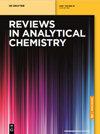Urinary carboxylic acids (UCAs) in subjects with autism spectrum disorder and their association with bacterial overgrowth
IF 3.8
3区 化学
Q2 CHEMISTRY, ANALYTICAL
引用次数: 5
Abstract
Abstract In this study, the levels of concentration of carboxylic acids (benzoic acid, p-hydroxybenzoic acid, p-hydroxyphenylacetic acid, and hippuric acid) in the urine of autistic children were investigated and compared. The increased excretion of carboxylic acids is related to excessive bacterial activity in the gut, called bacterial overgrowth, which has been related to autism spectrum disorder (ASD) as an impairment in the gut-brain axis. The investigation was based on the analysis of urine samples obtained from 120 ASD children. To identify and quantify urinary carboxylic acids (UCAs), we applied gas chromatography coupled with mass spectrometry (GC-MS). Additionally, we checked the influence of probiotic supplementation, gender, body mass index (BMI) value and age of children on the level of different selected compounds. Most of the obtained results were found within reference ranges. In some cases, the levels of benzoic acid, p-hydroxybenzoic acid, and p-hydroxyphenylacetic acid were particularly elevated. Statistically significant differences were observed in supplementation with probiotics and the level of p-hydroxyphenylacetic acid (p=0.036). The obtained results may indicate disturbances in the intestinal flora in some autistic patients and suggest that supplements may have an influence on the levels of carboxylic acids in urine. Due to the small population of children taking the supplement, further study are needed.自闭症谱系障碍患者尿中羧酸(UCAs)及其与细菌过度生长的关系
摘要本研究对自闭症儿童尿液中羧酸(苯甲酸、对羟基苯甲酸、对羟基苯基乙酸和马尿酸)的浓度水平进行了调查和比较。羧酸排泄的增加与肠道中细菌的过度活动有关,称为细菌过度生长,这与自闭症谱系障碍(ASD)有关,因为它是肠-脑轴的损伤。这项调查是基于对120名自闭症儿童尿液样本的分析。为了鉴定和定量尿羧酸(UCAs),我们采用气相色谱-质谱联用(GC-MS)技术。此外,我们还检查了益生菌补充、性别、体重指数(BMI)值和儿童年龄对所选化合物水平的影响。所得结果大多在参考范围内。在某些情况下,苯甲酸、对羟基苯甲酸和对羟基苯基乙酸的含量特别高。在添加益生菌和对羟基苯乙酸水平上观察到有统计学意义的差异(p=0.036)。所获得的结果可能表明一些自闭症患者肠道菌群紊乱,并表明补充剂可能对尿中羧酸水平有影响。由于服用补充剂的儿童人数较少,需要进一步研究。
本文章由计算机程序翻译,如有差异,请以英文原文为准。
求助全文
约1分钟内获得全文
求助全文
来源期刊

Reviews in Analytical Chemistry
化学-分析化学
CiteScore
7.50
自引率
0.00%
发文量
15
审稿时长
>12 weeks
期刊介绍:
Reviews in Analytical Chemistry publishes authoritative reviews by leading experts in the dynamic field of chemical analysis. The subjects can encompass all branches of modern analytical chemistry such as spectroscopy, chromatography, mass spectrometry, electrochemistry and trace analysis and their applications to areas such as environmental control, pharmaceutical industry, automation and other relevant areas. Review articles bring the expert up to date in a concise manner and provide researchers an overview of new techniques and methods.
 求助内容:
求助内容: 应助结果提醒方式:
应助结果提醒方式:


